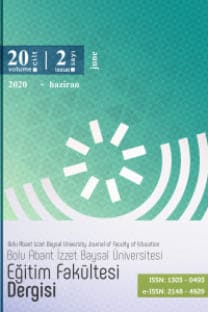FEN BİLGİSİ ÖĞRETMEN ADAYLARININ TEKNOLOJİK PEDAGOJİK ALAN BİLGİSİ ÖZ GÜVENLERİ VE BENLİK KURGULARI ARASINDAKİ İLİŞKİLERİN İNCELENMESİ: ABANT İZZET BAYSAL ÜNİVERSİTESİ ÖRNEĞİ
Bu araştırmanın amacı fen bilgisi öğretmen adaylarının benlik kurguları ve teknolojik pedagojik alan bilgisi öz güvenleri arasındaki ilişkilerin incelenmesidir. Bu amaçla iki farklı ölçüm aracı kullanılarak Abant İzzet Baysal Üniversitesinde öğrenim görmekte olan 237 öğretmen adayından veri toplanmıştır. Ölçeklerin geçerlik çalışması doğrulayıcı faktör analizi ile yapıldıktan sonra ilişkisel analizler Pearson Momentler Çarpımı Korelasyon Katsayısı ile gerçekleştirilmiştir. Bulgular, fen bilgisi öğretmen adaylarının özerk ya da özerk-ilişkisel benliğe yönelik inançlarının teknolojik pedagojik alan bilgisi öz güvenlerinin bazı boyutları ile pozitif ve anlamlı ilişkilere sahip olduğunu, diğer taraftan ilişkisel benliğe yönelik inançlarının negatif ve anlamlı ilişkilere sahip olduğunu göstermektedir. Bulgular doğrultusunda bazı araştırma önerileri sunulmuştur.
Anahtar Kelimeler:
Fen bilgisi öğretmen adayları, benlik kurgusu, teknolojik pedagojik alan bilgisi öz güveni, inanç sistemi
INVESTIGATING THE RELATIONSHIPS BETWEEN PRESERVICE SCIENCE TEACHERS’ TECHNOLOGICAL PEDAGOGICAL CONTENT KNOWLEDGE CONFIDENCE AND SELF-CONSTRUAL: EXAMPLE OF ABANT IZZET BAYSAL UNIVERSITY
The purpose of this study is to investigate the relationship between preservice science teachers’ self-construal and technological pedagogical content knowledge confidence. For this purpose two different scales were utilized to collect data from 237 preservice science teachers in Abant Izzet Baysal University. Validation of instrument results was completed by confirmatory factor analyses, then, correlational analyses was clarified by calculating Pearson Product-Moment Correlation Coefficients. Results show that preservice science teachers’ beliefs about autonomous and autonomous-related self have positive and significant relations with their certain dimensions of technological pedagogical content knowledge confidence. On the other hand, beliefs of related self have negative and significant relations. Certain implications were presented considering these results.
Keywords:
Preservice science teachers, self-construal, technoogical pedagogical content knowledge, belief system,
___
- Bahcivan, E. (2014a). Examining relationships among Turkish pre-service science teachers’ conceptions of teaching and learning, scientific epistemological beliefs and science teaching efficacy beliefs. Journal of Baltic Science Education, 13(6), 870-882.
- Bahçivan, E. (2014b). Investigating coherence between preservice science teachers’ conceptions of learning and teaching science: a phenomenographic study. Ahi Evran Üniversitesi Kırşehir Eğitim Fakültesi Dergisi, 15(3), 147-166.
- Bahcivan, E. & Kapucu, S. (2014). Turkish preservice elementary science teachers' conceptions of learning science and science teaching efficacy beliefs: is there a relationship? International Journal of Environmental and Science Education, 9(4), 429-442.
- Ertmer, P.A. (2005). Teacher pedagogical beliefs: The final frontier in our quest for technology integration? ETR&D, 53(4), 25-39.
- Ertmer, P.A. (1999). Addressing first- and second-order barriers to change: Strategies for technology integration. Educational Technology Research and Development, 47(4), 47-61.
- Fishbein, M., & Ajzen, I. (1975). Belief, attitude, intention and behaviour: An introduction to theory and research. Reading, MA: Addison-Wesley.
- Fives, H., & Buehl, M.M. (2012). Spring cleaning for the “messy” construct of teachers’ beliefs: What are they? Which have been examined? What can they tell us? In K.R. Harris, S. Graham, T. Urdan, S. Graham, J.M. Royer, & M. Zeidner (Ed.), APA Educational Psychology Handbook: Individual Differences and Cultural and Contextual factors (pp. 471-499). Washington, DC: American Psychological Association.
- Fraenkel, J.R., & Wallen, N. E. (2009). How to design and evaluate research in education. McGraw-Hill, Inc.
- Goktas, Y., Gedik, N., & Baydas, O. (2013). Enablers and barriers to the use of ICT in primary schools in Turkey: A comparative study of 2005–2011. Computers & Education, 68, 211-222.
- Graham, C. R., Burgoyne, N., Cantrell, P., Smith, L., St. Clair, L., & Harris, R. (2009). TPACK Development in Science Teaching: Measuring the TPACK Confidence of Inservice Science Teachers, TechTrends, Special Issue on TPACK, 53(5), 70-79.
- Heelas, P., & Lock, A. (1981). Indigenous Psychologies: The Anthropology of the Self. London: Academic Press.
- Kağıtçıbaşı, Ç. (2007). Family, Self, and Human Development Across Cultures, Theory and Applications (2nd ed.). London: Lawrence Erlbaum Associates.
- Kağıtçıbaşı, Ç. (1996). Özerk-ilişkisel benlik: Yeni bir sentez. Türk Psikoloji Dergisi, 11, 36-44.
- Kağıtçıbaşı, Ç., Baydar, N., & Cemalcılar, Z. (2006). Autonomy and relatedness scales (Progress report). Istanbul, Koç University.
- Kağıtçıbaşı, Ç., & Cemalcılar, Z. (2014). Dünden Bugüne İnsan ve İnsanlar Sosyal Psikolojiye Giriş (16th ed.). İstanbul: Evrim Yayınevi ve Bilgisayar San. Tic. Ltd. Şti.
- Lee, E., & Luft, J.A. (2008). Experienced secondary science teachers' representations of pedagogical content knowledge. International Journal of Science Education, 30(10), 1343-1363.
- Magnusson, S., Krajcik, J., & Borko, H. (1999). Nature, sources, and development of pedagogical content knowledge for science teaching. In J. GessNewsome & N. G. Lederman (Eds.), Examining pedagogical content knowledge (pp.95-132). Dordrecht, The Netherlands: Kluwer.
- Milli Eğitim Bakanlığı (2015). FATİH Eğitimde Geleceğe Açılan Kapı. Retrieved in May 15, 2015 from http://fatihprojesi.meb.gov.tr.
- Mitchem, K., Wells, D.L. & Wells, J.G. (2003). Effective Integration of Instructional Technologies (IT): Evaluating Professional Development and Instructional Change. Journal of Technology and Teacher Education, 11(3), 397-414.
- Pajares, M.F. (1992). Teachers’ beliefs and educational research: Cleaning up a messy construct. Review of Educational Research, 62(3), 307-332.
- Rokeach, M. (1968). Beliefs, attitudes and values. San Francisco: Jossey-Bass Inc.
- Shulman, L.S., (1987). Knowledge and teaching: foundations of the new reform, Harvard Educational Review, 57(1).
- Shulman, L.S. (1986). Those who understand: Knowledge growth in teaching. Educational Researcher, 15(2), 4-14.
- Timur, B., & Taşar, M.F. (2011). Teknolojik pedagojik alan bilgisi öz güven ölçeğinin (TPABÖGÖ) Türkçe’ye uyarlanması. Gaziantep Üniversitesi Sosyal Bilimler Dergisi, 10(2), 839-856.
- ISSN: 1303-0493
- Yayın Aralığı: Yılda 4 Sayı
- Başlangıç: 2000
- Yayıncı: Abant İzzet Baysal Üniversitesi Eğitim Fakültesi
Sayıdaki Diğer Makaleler
Esra TURHAN, Sally NEUMANN, Engin DİLBAZ
LİSE ÖĞRENCİLERİNİN DUYGUSAL ÖZERKLİK VE SOSYAL DESTEK DÜZEYLERİ ARASINDAKİ İLİŞKİNİN İNCELENMESİ
Serhat Armağan KÖSEOĞLU, Ayşegül ERÇEVİK
Türkiyede Fen Eğitiminde Kullanılan Ölçme Araçları Betimsel İçerik Analizi
Cemal TOSUN, Yavuz TAŞKESENLİGİL
OKUL ÖNCESİ ÖĞRETMEN ADAYLARININ FENE VE FEN ÖĞRETİMİNE YÖNELİK TUTUMLARININ İNCELENMESİ
Zekeriya NARTGÜN, Köksal CANİBEY
Esra TURHAN, Sally NEUMANN, Engin DİLBAZ
SÖZCÜK ÖĞRETİMİNİN ÖĞRENCİLERİN SAHİP OLDUKLARI SÖZCÜK SAYI DÜZEYLERİ ÜZERİNDEKİ ETKİSİ
Mert TOPKARAOĞLU, Hakan DİLMAN
İLKOKUL VE ORTAOKUL ÖĞRENCİLERİNİN YAZILI ANLATIM BECERİLERİNE İLİŞKİN ÖĞRETMEN GÖRÜŞLERİ
